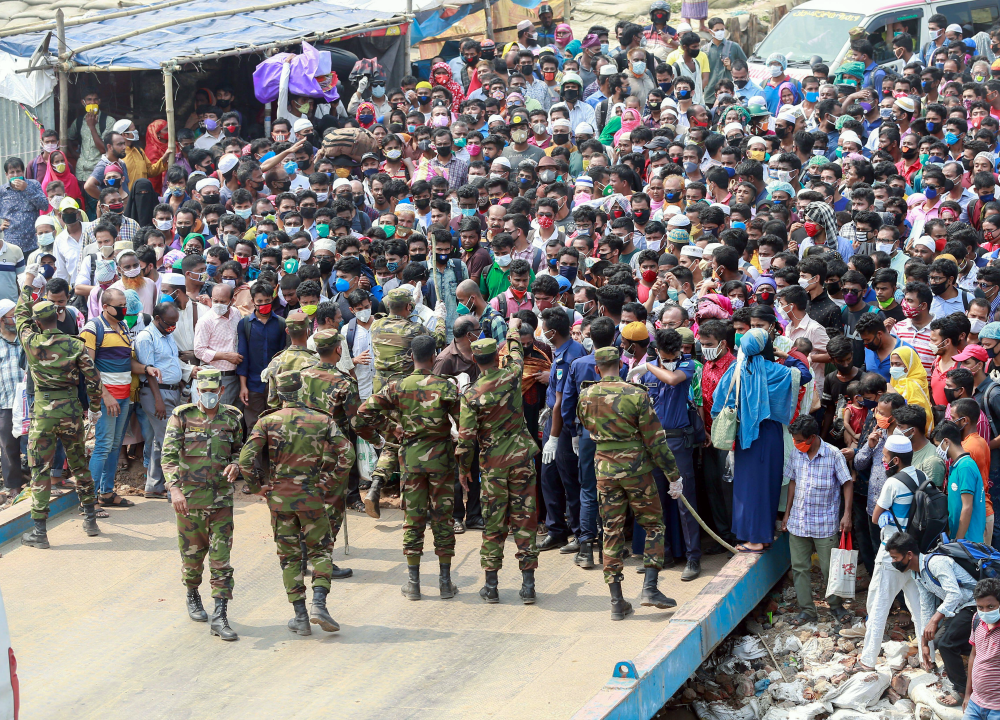Unadulterated cruelty
How both garment factory owners and the government have treated workers little better than slaves in Covid-19 infected Bangladesh.

The point is obvious. After what the leading figures of the Bangladesh Garment Manufacturers and Exporters Association (BGMEA) have done to these tens of thousands of workers — informing them that work in the factories would resume, compelling them to walk long miles from their villages and towns all the way to the capital, then telling them that the factories would remain shut — it is only morally right to ask why these affluent and uncaring men and women presiding over the nation’s readymade garments (RMG) sector have not yet been legally taken to task.
These leading figures of the BGMEA are guilty on four counts. First, they have defied the government’s directives on keeping everything closed within the ambit of a holiday as a precaution against the Covid-19 pandemic.
Second, by compelling these poverty-wracked workers to move in droves towards Dhaka, they have played truant with the social distancing requirements that have been decreed by the authorities, thereby increasing the risk of the virus being spread across the country.
Third, by forcing these hapless workers to make their way to their workplaces despite knowing full well that all transport, indeed all vehicular movement, was in a state of suspension all over the country, they were subjecting these people to unabashed and unadulterated cruelty.
Fourth, by informing these tired workers, once they had made the long, exhausting trek back to their workplaces, that the factories were not reopening after all, they committed a form of deception, which in itself is nothing less than criminality of the highest order.
Beyond these unassailable truths comes a question. Once the government was apprised of the situation, indeed was informed of the BGMEA move to reopen factories in defiance of its directives and of the news that the RMG workers were on their way to the capital, why did it not take swift action to avert the situation?
That action ought to have been two-pronged. In the first place, the BGMEA could have been forced to rescind its decision and the process of prosecuting its leadership for defying the rules of social distancing now in place could have got underway. In the second, the government on its own, once it learned of the workers moving towards Dhaka, have instructed the various local authorities to intercept the workers and persuade them to go back home through reassuring them that no one could take their jobs away.
In the event, nothing was done. These workers, overwhelmed by thoughts of family economy, by fears of job losses, are in the capital and in every place where the factories employing them happen to be situated. The BGMEA leadership, traditionally insensitive to the pains of its workers, has made no move to compensate them by paying the salaries they would have received had the holiday not come into force.
It is now time for the powers-that-be to fling the notion aside that governments must not interfere with the workings of the economy and step in to compel the BGMEA to cough up all the money its affiliated factories owe their workers. The argument made by the BGMEA chief that these workers must go back home in exactly the way they came to the city is and should be treated as a cruel joke. It is insensitivity to the ultimate degree. These suffering men and women — tired and emaciated and with families to feed — are not cattle. They are the masses on whose diligence thrive the owners of the RMG sector, on whose hard work much of the nation’s GDP depends.
These remarks of the BGMEA chief, the cruelty the organisation has perpetrated on the workers are but a reflection of the trauma a nation with a majority of its people trying to eke out a bare form of sustenance is forced into when it is weighed down by petty capitalism.
It is all a reminder for us of modern-day slavery in Bangladesh, of the cycle of exploitation going on and on and on. It is a cycle that has made it possible for an opportunistic educated class to steal the nation’s money and stow it away abroad. It has created manifold opportunities for the exploiting classes to come by fabulous wealth and earn for themselves the dubious reputation of entrepreneurship when they are little better than robber barons. It has given rise to a system where putatively educated people ruin the banking system and yet get away with their criminality. It has created a class of parvenus, of nouveau riche, who have their children educated abroad, who own villas abroad, in whose vision life is all a questionable dream of class advancement. The masses be damned!
In our people’s republic, the people have mattered progressively less since the day when petty, parasitic pseudo capitalism burrowed its way into our lives, pushing out the window our collective dream of a socialist order, of a just society based on the sovereignty of the people.
Rising growth rates do not matter. Greater export earnings are of little consequence. All talk of a graduation from a low income to a middle-income country loses meaning when workers are forced to walk mile after mile to their workplaces by men and women inhabiting that island of unaccountable wealth they have made for themselves, only to be told they will not be let in.
Politics will not matter as long as entities like the BGMEA override the authority of government. Businesses will not run smooth until trade unionism returns to being a vibrant presence in the industrial sector, indeed in every space that constitutes the modern nation-state. Statecraft will suffer as long as the state indulges the petty, pseudo capitalists who are today an albatross around the country’s neck.●
Syed Badrul Ahsan is a Bangladeshi columnist. This article was first published on his Facebook profile.